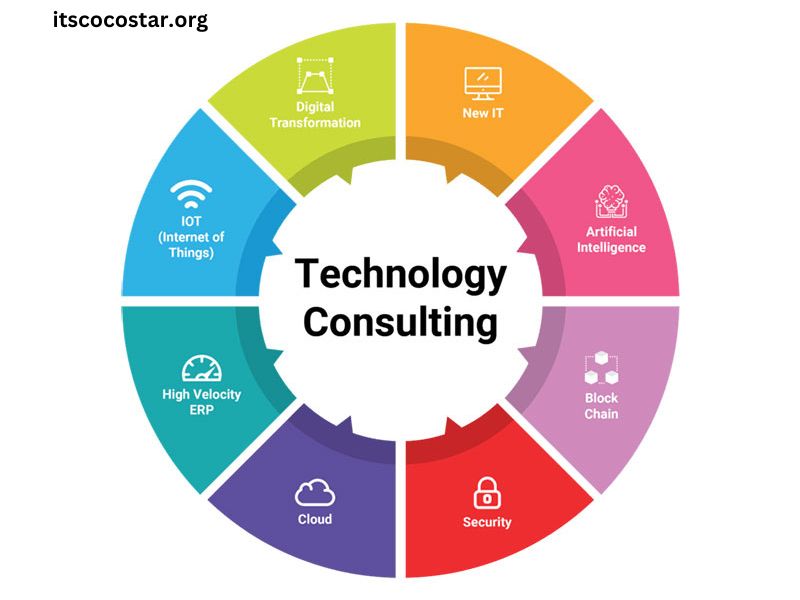In the ever-evolving landscape of business, consulting services play a pivotal role in helping organizations navigate complex challenges and achieve their strategic objectives. Among the various types of consulting, technology consulting and management consulting are two prominent fields that often come into consideration. While both aim to improve business performance, they do so through different approaches and areas of expertise. This article explores the key differences between technology consulting and management consulting, analyzing their respective benefits, challenges, and how they compare to determine which might be better suited for a particular organization’s needs.
Understanding Technology Consulting
Technology Consulting focuses on leveraging technology to solve business problems, improve efficiency, and drive innovation. It encompasses a broad range of services, including:
- IT Strategy and Planning: Developing a roadmap for technology implementation aligned with business goals.
- System Integration: Ensuring that various technology systems and software work together seamlessly.
- Cybersecurity: Protecting the organization’s data and systems from cyber threats.
- Cloud Computing: Implementing cloud solutions to enhance scalability and flexibility.
- Data Analytics: Using data to provide actionable insights and support decision-making.
- Technology Optimization: Enhancing existing systems to improve performance and reduce costs.
Technology consultants are often required to have a deep understanding of the latest technological advancements and trends. They must also possess technical skills to assess, implement, and optimize technology solutions effectively.
Benefits of Technology Consulting:
- Expertise in Emerging Technologies: Technology consultants bring specialized knowledge of the latest technologies, which can give organizations a competitive edge.
- Improved Efficiency: By implementing advanced technologies and optimizing existing systems, consultants can enhance operational efficiency and reduce costs.
- Enhanced Data Management: Technology consultants help organizations leverage data for strategic decision-making, leading to more informed business strategies.
- Cybersecurity: Consultants can strengthen an organization’s defenses against cyber threats, ensuring data protection and compliance with regulations.
- Scalability and Flexibility: Cloud solutions and other technological advancements allow organizations to scale operations and adapt to changing market conditions more effectively.
Challenges of Technology Consulting:
- Rapid Technological Changes: Keeping up with the fast-paced evolution of technology can be challenging and requires continuous learning.
- Integration Issues: Implementing new technologies may face resistance from employees and can lead to integration problems with existing systems.
- High Costs: Advanced technology solutions and consulting services can be expensive, particularly for smaller organizations.
- Complexity: Technology projects can be complex, requiring careful planning and execution to avoid disruptions to business operations.
Understanding Management Consulting
Management Consulting focuses on improving organizational performance through strategic and operational advice. It encompasses areas such as:
- Strategic Planning: Developing long-term strategies to achieve business goals and sustain competitive advantage.
- Operations Management: Streamlining processes to enhance efficiency and reduce costs.
- Human Resources: Improving workforce management, talent acquisition, and organizational culture.
- Change Management: Guiding organizations through transitions and ensuring successful implementation of change initiatives.
- Financial Advisory: Providing guidance on financial management, budgeting, and investment decisions.
Management consultants are expected to have a broad understanding of business management principles and industry-specific knowledge. They work closely with senior leadership to address organizational challenges and implement effective solutions.
Benefits of Management Consulting:
- Holistic View: Management consultants offer a comprehensive approach to solving business problems, addressing various aspects of the organization.
- Strategic Insights: They provide valuable insights and recommendations for long-term strategic planning and growth.
- Operational Efficiency: Consultants help optimize business processes, leading to cost savings and improved performance.
- Change Management Expertise: Management consultants are skilled in guiding organizations through change, minimizing disruptions and resistance.
- Industry Knowledge: They bring expertise in industry-specific challenges and best practices, offering tailored solutions.
Challenges of Management Consulting:
- Implementation Challenges: Recommendations may face resistance or be difficult to implement, affecting the success of consulting projects.
- Short-Term Focus: Management consulting engagements are often short-term, which may limit the ability to address long-term issues.
- High Costs: Consulting fees can be significant, especially for high-profile consulting firms.
- Dependence on Client Cooperation: The success of consulting projects often depends on the level of cooperation and engagement from the client organization.
Comparing Technology Consulting and Management Consulting
When comparing technology consulting and management consulting, it is important to consider the specific needs and goals of the organization. Both fields offer distinct advantages and address different aspects of business improvement.
1. Focus Areas:
- Technology Consulting: Primarily focuses on leveraging technology to solve problems and improve efficiency. It is particularly valuable for organizations seeking to adopt new technologies, optimize IT systems, or address cybersecurity concerns.
- Management Consulting: Addresses broader business challenges, including strategy, operations, and organizational culture. It is beneficial for organizations looking to improve overall performance, manage change, or develop long-term strategies.
2. Expertise Required:
- Technology Consulting: Requires specialized knowledge of technology and IT systems. Consultants need to stay updated on the latest technological trends and innovations.
- Management Consulting: Requires a broad understanding of business management principles and industry-specific knowledge. Consultants must be adept at analyzing organizational challenges and providing strategic solutions.
3. Benefits:
- Technology Consulting: Offers benefits such as enhanced efficiency, improved data management, and strengthened cybersecurity. It is ideal for organizations focused on technological advancements and digital transformation.
- Management Consulting: Provides a holistic approach to business improvement, including strategic insights, operational efficiency, and change management. It is suitable for organizations seeking comprehensive solutions to complex business challenges.
4. Challenges:
- Technology Consulting: Faces challenges related to rapid technological changes, integration issues, and high costs. It may also involve complex projects that require careful management.
- Management Consulting: Faces challenges related to implementation, short-term focus, and high costs. Success often depends on client cooperation and engagement.
Conclusion
Determining whether technology consulting or management consulting is better depends on the specific needs and goals of the organization. Technology consulting excels in areas related to IT and technological advancements, making it ideal for organizations focused on digital transformation and technological optimization. On the other hand, management consulting offers a comprehensive approach to improving overall business performance, making it suitable for organizations seeking strategic and operational improvements.
Ultimately, the choice between technology consulting and management consulting should be based on the organization’s objectives, the nature of the challenges it faces, and the expertise required to address those challenges effectively. In many cases, a combination of both types of consulting may provide the most comprehensive solution, addressing both technological and management aspects of the business.






